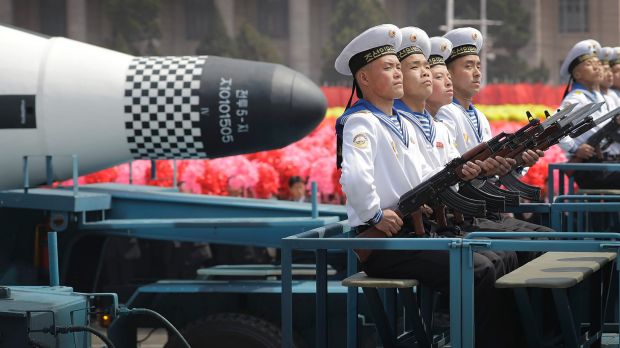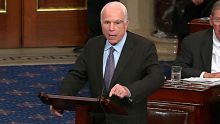One of the United States' most senior Navy commanders has acknowledged that accepting North Korea as a fully fledged nuclear power is "part of the dialogue" about how to deal with the rogue state.
In comments that appear conspicuously more moderate than typically emanate from the US government on North Korea, Admiral Scott Swift, Commander of the Pacific Fleet, said in Canberra he regarded a nuclear North Korea as one of the options "on the table".
More World News Videos
North Korea concerns heightened
The rogue country is more advanced in its nuclear missile development than previously thought.
The frank remarks from such a senior figure underscore the difficulty the world faces in stopping the regime's program, even as the Trump administration declares that the era of "strategic patience" is over and insists it won't accept a fully nuclear regime.
Mr Trump tweeted in January of dictator Kim Jong-un's ambition to develop a nuclear weapon that could reach the US: "It won't happen!"

Prime Minister Malcolm Turnbull has also said that Australia would "not tolerate reckless, dangerous threats to the peace and stability of our region" from North Korea.
US media have reported in recent days that intelligence assessments now forecast North Korea could have a nuclear-capable intercontinental missile able to reach the US or Australia by next year. Both US and South Korean officials reportedly fear Pyongyang could test fire another missile this week to mark the 64th anniversary of the end of the Korean War.
But many experts say there is little option but to accept that North Korea may become a full nuclear power given China's hesitance in taking firmer action, and the risks attached to the US and its allies using military force to prevent the regime reaching its goal of being able hit other continents with nuclear missiles.
Asked for his opinion on these views, Admiral Swift said that "rightfully it's part of the dialogue and I think that's an important element of the dialogue" among "decision-makers and policy-makers" in the US and other countries in the Asia-Pacific region.

Asked to clarify whether that meant the world might have to live with a nuclear North Korea that could strike other continents, Admiral Swift said: "It's not for me to say. It's part of the dialogue is what I'm acknowledging. When people say, 'everything is on the table,' in my mind I think it includes a dialogue with respect to North Korea as a nuclear power. I don't know if that's acceptable. I'm not part of those discussions. But I know that's part of the dialogue because people are reporting on it."
Asked for his response to the fact that the stated US position is that it cannot tolerate a nuclear North Korea, Admiral Swift said: "I'm not a policy-maker. That may very well be the policy that the United States arrives at. But that now becomes the starting point for the dialogue."

He said that military intervention was also part of the dialogue. And he stressed that it was not just a discussion for the US because different countries had different thresholds regarding North Korea depending on their geographic distance and the capability of Pyongyang's program.
"It's important that we not centralise this to any one country's view because the threat is a collective threat," he said.
"It's driven by distance and the ability to weaponise a missile that can travel that distance. One country can come to closure and be very comfortable with what the outcome is. There may be three or four countries that that outcome is not acceptable to them for any number of reasons."
He said that no simple solution was going to emerge and this was going to be a complicated and long-term process.
"I think everyone needs to understand that that: that there's not going to be this revelation of solution," he said.
"There needs to be a broad discussion of what's the region going to do from the long term with respect to a nuclear North Korea. Clearly they're headed in that direction, I think we're going to have a discussion of how fast they're going to arrive at that destination, whether they're at that destination now."















